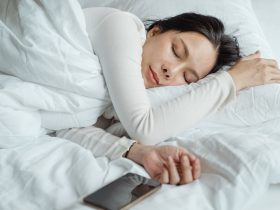We will be discussing in this article how sleep benefits mental health. We will suggest different techniques that can be used to help you clear your mind from those racing thoughts when you jump into bed, and also what behavioral strategies you can use to prepare yourself before you hit the sack.
If you had to guess how long a single human being will sleep throughout his or her lifetime, what would your guess be? We actually sleep for a third of our lives! Sleep is an essential and involuntary process, without which we cannot function effectively.
Insomnia, unfortunately, is a common problem. According to some estimates, it affects 33% of the world’s population. Even people without chronic insomnia often struggle with sleep problems. According to the Centers for Disease Control and Prevention (CDC), a third of adults in the U.S. report that they get less than the recommended amount of sleep each night.
So how does sleep benefit mental health?
Sleep is just as important as eating, drinking, and breathing and is absolutely vital when it comes to good mental and physical health. In fact, a good night’s sleep is connected very closely to good mental and physical health. Sleep deprivation affects your mental health. And those with mental health problems are more likely to have insomnia or other sleep disorders.
It’s true that we don’t fully understand the connection between sleep and mental health. However, neuroimaging and neurochemistry studies show that a good night’s sleep helps strengthen our mental and emotional resilience, while people who struggle to sleep tend to have negative thinking and can be emotionally vulnerable.
Key points to keep in mind regarding sleep and mental health
- Insomnia and other sleep-related issues are more likely to affect people with mental health issues than the general public
- One way to alleviate the symptoms of mental health is by treating your sleep disorder
- Sleep deprivation can increase the risk of developing mental illness
Research suggests that there is a complex relationship between sleep and our mental wellbeing. Lack of sleep is linked to a number of unfavorable health consequences including heart disease, type 2 diabetes, and depression. Some symptoms associated with sleep deprivation could be: Anxiety, irritability, erratic behavior, forgetfulness, immune damage
We can all benefit from improving the quality of our sleep. In many cases, it’s just small changes that we need to make in order for us to sleep better. Of course, anyone who suffers from insomnia will need specialist help and may need medication to help deal with the problem, however, the majority who suffer from sleep deprivation are not necessarily insomniacs and with some simple techniques and behavioral strategies can overcome their sleep problems.
Behavioral strategies to improve your sleep and mental health
- Physical activity – There’s are many research papers that prove that exercise helps improve sleep. Making exercise part of your regular routine can contribute to healthier, more restful sleep—and may help improve sleep issues such as insomnia.
- Change our lifestyle – Alcohol, caffeine, and nicotine all contribute to ill health and in turn to sleeplessness. If you can’t avoid these completely, try to avoid them before sleep.
- Relaxation techniques – Meditation, Guided Imagery, and deep breathing techniques can help counter racing thoughts that may keep us awake.
There is no universal answer to the question of how much sleep a person needs. This varies from person to person. What is important is that people find out how much sleep they need and ensure that they achieve this. For more things that benefit our mental health, check out our blogs on massages, air purifiers, and plants.




















28 Comments